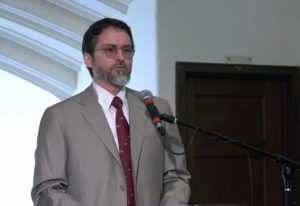
Hamza Yusuf was born as Mark Hanson in Walla Walla, Washington to two academics working at Whitman College and he was raised in northern California. He grew up a practicing Greek Orthodox Christian and attended prep schools on both the east and west coasts. In 1977, after a near-death experience and reading the Qur’an, he converted from Christianity to Islam[5] (he seemed destined for the Greek Orthodox priesthood at his early age). Yusuf has Irish, Scottish and Greek ancestry.
After being impressed by a young couple from Saudi Arabia who were followers of Abdalqadir as-Sufi—a Scottish convert to Islam and leader of the Darqawa Sufi order and the Murabitun World Movement—Yusuf moved to Norwich, England to study directly under as-Sufi. In 1979, Yusuf moved to Al Ain in the United Arab Emirates where he spent the next four years studying Sharia sciences at the Islamic Institute, more often on a one-on-one basis with Islamic scholars. Yusuf became fluent in the Arabic language and also studied Qur’anic recitation (tajwid), rhetoric, poetry, law (fiqh) and theology (aqidah) among other classical Islamic disciplines.
In 1984, Yusuf moved in a different intellectual direction having been influenced by a number of Mauritanian scholars residing in the Emirates. He moved to North Africa in 1984 studying in Algeria and Morocco, as well as Spain and Mauritania. In Mauritania he developed his most lasting and powerful relationship with Islamic scholar Sidi Muhammad Ould Fahfu al-Massumi, known as Murabit al-Hajj.
He and other colleagues founded the Zaytuna Institute in Berkeley, California, United States, in 1996, dedicated to the revival of traditional study methods and the sciences of Islam.
He is an advisor to the Center for Islamic Studies at the Graduate Theological Union in Berkeley. He also serves as a member of the board of advisors of George Russell’s One Nation, a national philanthropic initiative that promotes pluralism and inclusion in America. In addition, he serves as vice-president for the Global Center for Guidance and Renewal, which was founded and is currently presided over by Abdallah bin Bayyah. He is also serves as the vice-president of the UAE-based Forum for Promoting Peace in Muslim Societies, where Abdullah bin Bayyah also serves as president.
The Guardian newspaper in the United Kingdom reported that “Hamza Yusuf is arguably the west’s most influential Islamic scholar.” Similarly, The New Yorker magazine reported that Yusuf is “perhaps the most influential Islamic scholar in the Western world.”




Comments